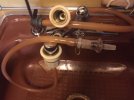Since the question of using isopropyl Alcohol and silicone hoses comes up a lot, I thought I’d add a quote that I just read. This is specifically about medical grade silicone. I’ve learned there are a lot of TYPES of silicone tubing, their chemical makeup and how it’s cured. But basically, most high end QUALITY silicone can handle ISO, as well as a BOILING water bath.
QUOTE FROM WEB PAGE:
“I just wanted to share something with everyone, and I hope it helps. Like many people here, I’ve been REALLY curious about gathering some facts on proper care of medical grade silicone. So I decided to turn to someone who works with this material regularly-- and ask them their professional opinion. I have forwarded the below letter to the head of a custom medical grade silicone molding company (they take custom moldings from hospitals for patients, and create artificial body parts of various kinds), and he sent me his reply.
Here is the company I contacted:
“ASC Applied Silicone Corporation”
SILICONESALES@APPLIEDSILICONE.COM
Here is the letter I wrote:
Dear Richard,
I was wondering if you could help me. I have a question about medical grade silicone-- Are there any sterilizing/cleaning solutions or lubricants that can damage it? I ask because I’m part of an online support community of people who use “menstrual cups”-- small, flexible cups made of medical grade silicone, that are worn internally, to collect menstrual fluid, rather than absorbing it. The manufacturers recommend that during use, we should wash them daily with mild, perfume-free soap. Then sterilize by boiling for 5 minutes. Some of the companies forbid most sterilizing solutions, claiming they damage the silicone. But many of us aren’t sure what to believe on this matter. Especially when it comes to things like rubbing alcohol, peroxide, oil-based lubricants, etc. We wonder if the company’s recommendations are meant to increase sales of their special “cup wash” or to make our cups discolor faster, so we buy new ones more often. Could you (or someone you are associated with) please help to shed some light on this subject?
Thank you in advance-- Melissa
And here is what he had to say:
Dear Melissa,
My background consists of 30 years as a Research and Development Engineer involved in the development of silicone elastomers and implantable silicone devices. I agree with the manufacturers recommendations for cleaning the silicone cups. Silicone has poor resistance to acids and bases found in sterilizing solutions and hydrogen peroxide. I have personal knowledge of silicone degradation caused by beta dyne solutions commonly used as a micro biocide in surgery. Isopropyl alcohol (IPA) can cause slight temporary swelling of the silicone, but as long as it is allowed to evaporate completely it will not deteriorate silicone. Oil based lubricants can swell/permeate the silicone and may not readily evaporate and can cause a loss in physical properties. My main concern with oil based lubricants would be biocompatibility in such a sensitive tissue environment.
Best Regards,
Richard Dumas
Director of Technical Service
Applied Silicone Corporation
270 Quail Court, Santa Paula, CA 93060 USA
Email Address: (removed for his online privacy, send me a private message, if you feel you need to speak to him)”
——- END OF QUOTE————-




 )
)